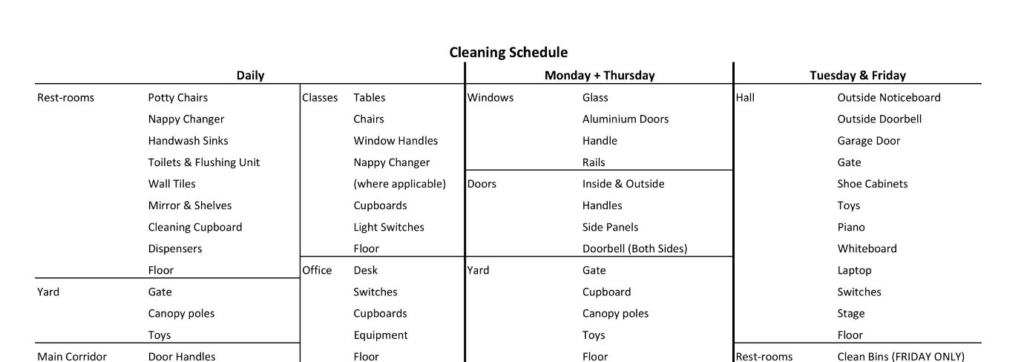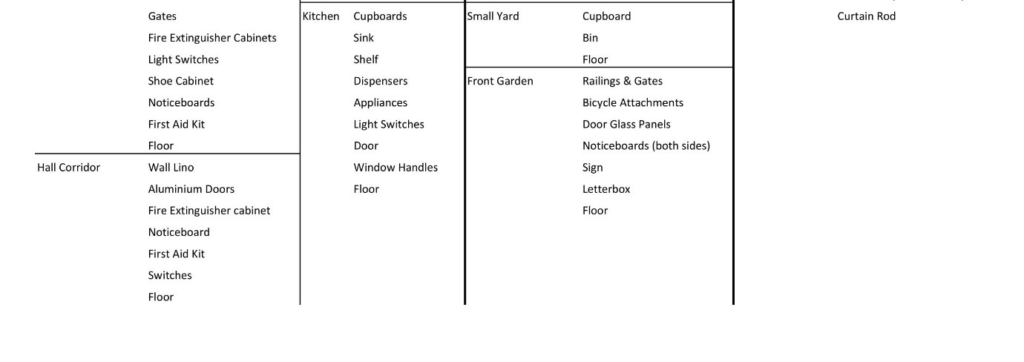Version: May 2023
Our mission
Our mission is to provide children with a holistic developmental experience in a loving environment through various educational activities and experiences.
Admission to child day-care facility
Parents interested in viewing the premises can phone, send an email or message via the Facebook page to schedule an appointment with the school director. The director (or a delegate) will meet the parents and their child to explain the school policies, give a tour of the premises and answer any questions.
The registration form must be filled in and returned, as early as possible, with a copy of the birth certificate, both parents’ ID cards, a passport-sized photo of the child and up-to-date immunisation records.
If the child is to benefit from the Free-childcare Government Scheme, then (in addition to the above), the
completed Free-childcare Scheme form together with the relevant additional documents are to be handed in by the second week of the month preceding start of school for the child (example: if the child is to start school in May, then the form together with the accompanying documents are to be handed in by the second week of April).
Any change requests to a child’s entry date need to be communicated at least one month prior to the child’s start date, late advising will result in parents having to pay for the first month that the child was supposed to attend.
The school reserves the right to refuse any registration. The final decision lies with the school director.
Working in partnership with parents
Communication
From the start, parents are encouraged to work closely with the staff to ensure the best development of their child. Three Parents’ Days are held during the year to keep parents updated with their child’s improvement. Communication with parents is carried out through electronic channels.
Punctuality
School starts at 8am, children are expected to arrive no earlier than 7:45am (unless using the childminding service) and no later than 8:15am. School ends at 1pm, children are expected to be collected no earlier than 12:45pm and no later than 1:15pm (unless using the childminding service).
School uniform and personal belongings
Everything sent to school must be labelled; personal toys from home are not allowed. It is important that the children come to school in full uniform according to the season. Socks can be either: red, yellow, green, blue, or white. Earrings (if worn) should either be studs or sleepers (hoops close to the ears). Parents are to send a full set of spare clothes in the child’s bag.
Children and staff change their shoes upon entry to the premises, so children will need to keep a pair of shoes in their pigeon-hole between Monday and Friday. The shoes are then sent home on Friday, to be returned again on Monday. Shoes can be any colour, as long as they are comfortable, cover the entire foot, and easy to open and close (example, Velcro trainers or shoes; sandals are not accepted).
Only one bag per child is allowed, bags should be large enough to fit an A4 book, and not bigger than a
standard-sized school bag. Cooler bags need not be sent, anything requiring cooling or heating should be labelled and items will be refrigerated accordingly.
There is absolutely no need to send tissues or wipes in the child’s bag, as these are provided by the school. St Cecilia’s makes use of water wipes to ensure that there are no allergic reactions.
Personal pushchairs or any kind of baby carriers are not allowed inside the premises.
Safety of children
St Cecilia’s (Tarxien) undergoes a periodical Health and Safety audit to ensure a positive environment for
children and adults alike. In addition, every precaution is taken to ensure that each child is safe both at school and also during school outings.
Restricted Access to the Premises
Parents or guardians are only allowed on the premises by appointment (including in the reception area). Parents are encouraged to get in touch via alternate means to discuss any matters required.
Sick child and accident management
Sickness
If a child’s temperature is equal to or greater than 37.2 degrees Celsius or if there are any signs of respiratory infection, the children will not be allowed to attend the Childcare and must stay home. Signs include cough (dry or productive), loss of appetite, chills, nasal congestion, headache, feeling unwell/fatigue, sore muscles, runny nose/sneezing, sore throat/hoarseness, wheezing, shortness of breath/difficulty breathing, diarrhoea, vomiting or other.
If a child is found to be ill after having been dropped-off, the parents will be contacted and asked to collect the child immediately, and a doctor’s certificate stating that the child is fit for school would then be required prior to return.
Prior to return from any sickness-related absence, a doctor’s certificate covering the absence period and stating when the child will be fit for school, will be required. When a child is absent from school due to illness, the parents are to inform the school immediately (especially in the case of highly contagious diseases, such as Covid-19, Chickenpox, Hand, Foot and Mouth, and others).
As of June 4th 2020, following the lifting of Government lockdown restrictions, and until guidelines set by the Health Directorate are changed or removed, parents sending their child/children to St Cecilia’s Childcare & Kindergarten (Tarxien) are automatically giving free consent for the management of St Cecilia’s Childcare & Kindergarten (Tarxien) to pass on their details as well as the details of their child/children to Health authorities should there be the need in the case of Covid-19 illness.
Suspected cases of Covid-19
St Cecilia’s Tarxien will immediately notify parents/guardians if their child begins to show symptoms of
COVID-19 while on the premises, including the need for immediate pick up.
Parents are required to advise the management if a family member or relative has tested positive for COVID-19 and must not bring the child to the Childcare for fourteen days.
Where a swab test has been recommended, the child is to remain at home until a negative test result has been received. Any result, whether Positive or Negative, is to be forwarded to the Centre immediately. St Cecilia’s Tarxien reserves the right to ask families returning from abroad to get tested and await a negative result before their child/children are allowed on the premises.
Accidents
In the case of a minor accident at school, first aid will be administered by members of staff, the parents are called and informed of the situation, and asked to check on the child at their earliest convenience. An Accident Report is then filled in and signed by both staff and parents and kept for school records.
However, should there be a greater accident, relevant members of staff will administer first aid and call an
ambulance (as part of the first aid procedure) to ensure that the child receives any professional treatment needed as quickly as possible. The parents are then called to either collect the child or to accompany the child to hospital depending on the severity of the accident. An Accident Report is then filled in and signed by both staff and parents and kept for school records.
Behaviour management
Promoting Good Behaviour
All children try to push the boundaries, it is how they learn about the world around them. Helping them identify what is good and acceptable behaviour is part of our goal of giving children a holistic developmental experience at school. Correcting the behaviour rather than the child is key to helping children learn this. It is not the child who is ‘bad’ but the action. Children are taught to be responsible for their actions, whether they are good or otherwise. Helping them realise the errors in their actions is crucial for their development. Should there be a case of repeated and/or intentional bad behaviour, the child’s primary care givers (parents and/or guardians) will be contacted so as to work together to find a solution.
Biting
Several children go through a biting phase between 12 – 36 months because they feel frustration at not being able to communicate their wants and needs. If a biting incident should occur, the victim will be treated first, then the biter will be guided to realise the wrong done and apologise to the victim. Parents of both parties will be informed. Episodes of biting are tackled carefully, and staff aim to help the child realise what has happened and why it is wrong.
Child protection
Collection
When a child is due to start at St Cecilia’s, the parents fill in a form with information on who is authorised to collect their child from school. If someone different will be collecting the child on a particular day, the parents are to contact the school and provide the full name & ID number of person/s collecting the child. If someone different comes to collect without our knowing in advance, a member of staff will contact the parents to confirm authorisation.
Abuse and/or Neglect
If a member of staff suspects that a child is being abused or neglected, the situation is discussed with the school director and, if minor, brought to the parents’ attention. If, however, the situation doesn’t improve and/or the child is deemed to be at immediate risk, the members of staff and the director will compile a report, and this is then submitted to Child Protection Services.
Transition
Initial entry to childcare
Initiation into a school setting is a very important and delicate moment in a child’s development as it is the initial transition between home and school. Thus, it needs to be handled with great care.
Newcomers are introduced to the school gradually, starting with a minimum of two hours, then increasing
gradually in pre-determined increments. This may be amended if the child is taking long to adapt. This system has proved helpful in recent years and new children settle down happily after a short period of time. Parents are welcome to call the school at any time to monitor their child’s initiation into the school system.
End of Free Childcare Scheme
According to the Free Childcare Scheme regulations, children who turn three years of age between January and April will have their scheme terminated at the end of January. For this reason, they will be contacted in advance to confirm whether they will be staying on, and asked for a deposit if in the affirmative.
Transfer to Kindergarten
The management automatically reserves a spot in the kindergarten section for all children who turn three while finishing their childcare years at St Cecilia’s (Tarxien). For this reason, towards the end of their last scholastic year in the childcare section, parents will be contacted and asked to confirm whether their children will be staying on for kindergarten at St Cecilia’s.
Uncollected child
If a child is not collected from school, a member of staff will phone the child’s parents to remind them that the child is still waiting to be collected.
Healthy Lifestyle
Promoting Healthy Eating and Exercise
At St Cecilia’s we believe that the nutritional habits formed at a young age have a major influence on the child’s long-term health and well-being. We aim to continually improve the long-term health of the children in our care by working with parents to collaboratively promote and support a healthy lifestyle. Healthy eating is important. We implement this by discouraging our pupils from eating unhealthy food, especially on a daily basis. Please support us by ensuring your child comes to school with fruit and/or a healthy alternative (yoghurt, plain cereal and sandwiches are ideal as lunchtime snacks to be consumed at school, together with water or milk as drinks).
Sweets, packets, chocolate, sugary-drinks (such as juices, squash, and flavoured-water) or energy drinks are not allowed!
For further guidance kindly refer to the links below:
> 6 months – 3 years: https://hpdp.gov.mt/sites/default/files/2023-07/Dietery_Guidelines_for_Infants_and_Young_Children_en.pdf
> 3 – 12 years: https://hpdp.gov.mt/sites/default/files/2023-07/dietary_guidelines_for_maltese_children_en.pdf
Important notes
> Since a number of children develop nut allergies that may yet be undetected during their childcare years, St Cecilia’s strives to maintain a nut-free environment. For this reason, pesto is not accepted as part of children’s lunches, unless one can verify that it is nut-free.
> Due to food-poisoning concerns, rice is not accepted as part of children’s lunches, and will be disposed of to eliminate any risks.
Members of staff aim to support healthy eating with healthy exercise. They assist children in participating in simple gardening projects, educational exercises, and involvement in food preparation, while being positive role models.
Hygiene
Hygiene is also important for a healthy lifestyle. Cleanliness is given great importance at St Cecilia’s. Children are encouraged to wash their hands regularly and members of staff are constantly cleaning after the children to ensure a hygienic environment. Parents can support us in this by making sure children come to school clean, with hair tied-up and nails cut short.
Equal Opportunities
No discrimination
At St Cecilia’s we are committed to taking positive and proactive steps to ensure a safe and caring environment, free from discrimination, for everyone. We aim to provide a welcoming and caring environment that promotes and reflects cultural and social diversity and is equally accessible to all. All staff members endeavour to challenge any offensive behaviour, language, or attitudes with regards to race ethnicity, nationality, class, religion, culture, gender, language, sexual orientation, or disability. Our aim is to ensure that none of these inhibit a child from accessing all the opportunities that are provided within our school setting.
Inclusion
Our school policy regarding inclusion is to welcome people from all walks of life, irrespective of race, religion, or social background. We are primarily a Roman Catholic school but children from other religions are welcome, and their values respected as they respect ours.
Staff recruitment
Members of staff are recruited by the Senior Management Team who seek to employ only those with
satisfactory qualifications and aptitude, along with other requirements. A trial period determines whether a new member of staff is suitable for the position or not.
Staff development
Staff Meetings are organised periodically to discuss and consolidate staff knowledge of requirements and
procedures. Members of staff also attend courses to keep updated, which helps their professional development. Courses are also organised by the school, some of which might be open to parents who are interested in attending, to learn more about caring and assisting children in their learning and development.
Staff supervision
The Senior Management Team is actively involved in conducting staff appraisals to ensure that all members of staff are professionally supported, to ensure quality care and professional development.
Whistle blowing
Parents may forward any complaints that they may encounter in the provision of Child Day Care Services to ensure the best interests of all concerned, above all, the best interest of the children. Complaints may be forwarded to the DQSE through email on customercare.dqse@gov.mt, by telephone on (+356) 2598 1414 or by post by filling in the MEDE Complaint Form available
from https://education.gov.mt/en/childcareservices/Pages/Complaints-Procedure.aspx, and sending it to The Director, Quality Assurance Department, Education Village, Joseph Abela Scolaro Street, Hamrun.
Harassment or victimisation will not be tolerated. No action will be taken against anyone who makes an
allegation in good faith. Every effort will be made to ensure confidentiality in as far as this is reasonably
practical.
Complaints about the service
Good practice includes valuing and respecting children as individuals as well as modelling of appropriate
conduct by adults. All members of staff at St Cecilia’s have a duty to act upon any information received in
respect of a child in their care and will contact relevant agencies as appropriate. Our aim is to encourage all staff, students, volunteers, or parents, who have serious concerns, to come forward and report them.
Parents are encouraged to discuss concerns with the school director who will investigate accordingly. The
director will ensure that the parents and staff get a response to their concerns and that they are aware of how to pursue them and get feedback on any action taken as a result.
Complaints should preferably be in writing and addressed to the school director who will investigate the matter and report back to the parties concerned. The school director may opt to refer the matter to competent authorities such as the Social Services Department, the Education Directorate, or any other relevant agency.
Data protection
Child’s personal records
> Data
Children’s detailed records are kept confidential, accessed only by administrative staff. Other members of staff have access to limited details (such as name, phone numbers and eligible pick-up person/s).
> Photos
Parents will be asked to fill in a form detailing whether a child can appear on the different platforms that the school makes use of (such as social media, website, etc.).
Staff records keeping
Staff members’ detailed records of qualifications are kept confidential, accessed only by the director. These are made available to external auditors upon request.
To whom we disclose information
> Authorized third-party vendors and service providers. We may share your information with third-party
vendors and service-providers that help us with specialized services, including billing, payment processing, customer service, email deployment, business analytics, marketing, advertising, performance monitoring, hosting, and data processing.
> Legal purposes. We may disclose information to respond to subpoenas, court orders, legal process, law enforcement requests, legal claims or government inquiries, and to protect and defend the rights, interests, health, safety, and security of St Cecilia Tarxien Ltd, our affiliates, users, or the public.
Retention Period
Personal Data will be retained for not more than twelve months from the child’s termination date at the school, or from the planned start date in case the child never attends St Cecilia’s.
Approach to care, learning and play.
At St Cecilia’s the pedagogy for learning revolves around the theories of Jean Piaget and Lev Vygotsky,
learning activities are then implemented through the Reggio Emilia Approach. Children are exposed to a variety of experiences whereby they experiment and explore different materials in a learning by doing mentality. They are given opportunities to learn on their own, then should the child require, they are aided through a scaffolded method. The Reggio Emilia approach is implemented through using ideas coming from the children and then creating projects using a variety of natural materials, that in turn heighten their sensory exposure and thus contribute to their holistic development.
These hands-on learning experiences help them master five broad learning outcomes (as outlined in the National Curriculum Framework), namely:
> Children who develop a strong sense of identity
> Children who have a positive self-image
> Children who are effective communicators
> Children who are socially adept
> Children who nurture positive attitudes towards learning and become engaged and confident learners.
These are developed through different experiences and activities which occur during the school day. Literacy, numeracy, science and religion are explored through a project-based approach. Sensory play, music, art, storytelling, outdoor play and role-play are fundamental in our educational programme and are incorporated in different ways throughout the day. This provides children with all the benefits of a cross-curricular approach to learning and development.
Through a mixture of adult-led and child-led learning opportunities, children develop their own ideas, share with their peers and learn to believe in themselves and their capabilities. Through a mixture of structured and spontaneous play, they develop and refine their social skills and discover new talents.
Internal Review Process
High quality standards are assured by four principal means. The first is close supervision of new educators and frequent communication between all members of staff. As previously mentioned, new educators are in daily communication with their mentor and the Manager/Director. Any problems or complaints are immediately discussed and resolved, if and to any extent possible.
The second way of assuring quality teaching is through educator observations. All educators are observed at least once a year. New educators should be observed by the Manager/Director by their second week. Moreover, when a problem is believed to exist, educators are observed as often as deemed appropriate.
The third test of quality is questionnaires. During an internal audit, parents or guardians of children at the school have the opportunity to evaluate their experience and that of their children. Comments are taken seriously, and any comments indicating dissatisfaction are discussed by the educator and the Manager/Director. Educators will be given as much assistance as possible, but each individual educator is ultimately accountable for his/her own performance.
The children’s performance is the fourth indicator of the quality of instruction. As the children move from class to class, the next educator is able to evaluate general ability. This final test serves as an overall evaluation of the school’s academic effectiveness.
While problems in performance are discussed with the educator immediately, overall performance should be reviewed through a formal process. The Manager/Director will consider the results of observations and
questionnaires, as well as comments from parents/guardians and staff in reaching his/her conclusions.
Working in Partnership with Early Years Professionals
We strongly believe in the power of collaboration and working in partnership with early years professionals to create the best possible environment for the children in our care. We warmly welcome professionals who have our children as their private charges to visit our center, observe our practices, and even hold sessions if desired. This policy outlines our commitment to establishing strong partnerships and creating an inclusive and collaborative environment.
We emphasize open lines of communication and encourage active collaboration between our center and early years professionals. We hold a deep respect for the expertise and unique perspectives that visiting professionals bring to our center. We recognize and value their skills, knowledge, and experiences in the field of early childhood education and care. Our aim is to create an environment that appreciates and acknowledges the contributions of all professionals involved, fostering a culture of mutual respect and recognition. We actively seek opportunities for professional development activities, workshops, or training sessions to enhance our collective knowledge and skills.
Visiting professionals are wholeheartedly encouraged to observe our practices, programs, and interactions with the children. We understand the value of diverse perspectives and the insights they can bring to our learning environment. To ensure a smooth and informed experience, we will arrange the necessary schedules, routines, and provide any relevant policies or procedures to visiting professionals.
If visiting professionals express interest in holding sessions or workshops for the children in our center, we are open to supporting these activities. We believe that such sessions can enrich the learning experiences of the children, as well as provide an opportunity for collaborative learning between professionals. We will work together to ensure that these activities align with our curriculum and policies.
We prioritize the confidentiality and privacy of all children, families, and staff members. Visiting professionals are required to adhere to strict confidentiality guidelines, especially regarding any personal or sensitive information they may come across during their visits. We will implement appropriate safeguards to protect the privacy and well-being of everyone involved.
Medication
The health and safety of the children in our care is of utmost importance. As a center without a resident nurse, we are unable to administer medication to children. Our policy regarding medication administration is as follows:
Responsibility for Medication:
We do not have the capacity to administer medication to children at the center. It is the responsibility of parents or their designated representatives to administer prolonged medication, such as puffs for asthma or Epipens for severe allergies, when necessary. In the event of a medical emergency, the center will follow established emergency procedures. We will immediately contact emergency medical services and notify the child’s parent or legal guardian.
Illness-Related Medication:
Children who require medication for illnesses, including antibiotics, should remain at home until the course of medication is completed. We cannot accept medication from parents or representatives for administration while the child is attending the center.
Communication and Documentation:
Parents or legal guardians must provide written notification to the center regarding any life-threatening
conditions or medication requirements their child may have. It is essential to promptly communicate any
changes or updates to the child’s medication to ensure their well-being.
We kindly request the cooperation of parents in adhering to this policy to maintain a safe and healthy
environment for all children at our center.
Immunisation
It is the responsibility of parents or legal guardians to ensure their child receives the required immunizations as per the national schedule. They must provide the center with proof of immunization. Immunization records are kept confidential and securely stored.
Parents are required to follow the national immunization schedule provided below:
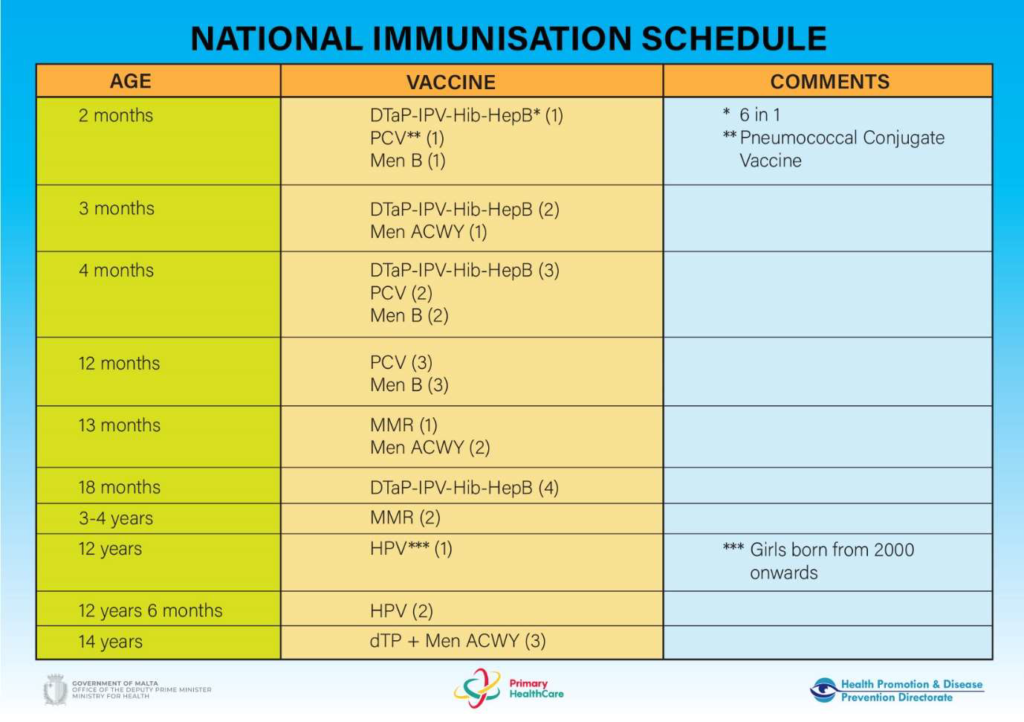
Appendices
Admission Form
We would like to inform all parents that our admission form is exclusively available in an online format. This online version of the form will be distributed only to parents who have already visited our center and have been assured of a place for their child.
To ensure a smooth admission process and prioritize those who have expressed genuine interest in enrolling their child at our center, we kindly request that only parents who have visited our center and received confirmation of availability request the online admission form.
We appreciate your understanding and cooperation as we strive to streamline our admissions process and provide the best possible care and attention to each child at our center.
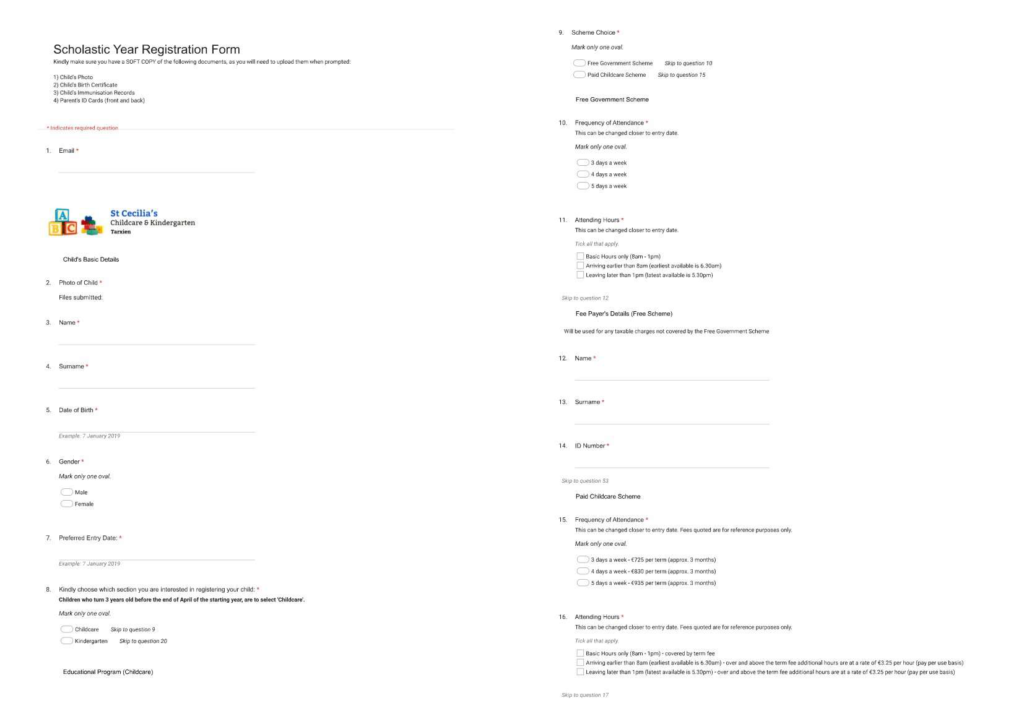
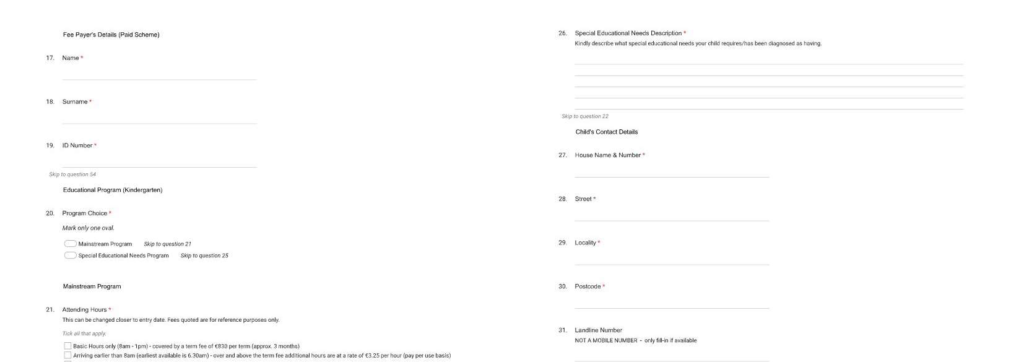
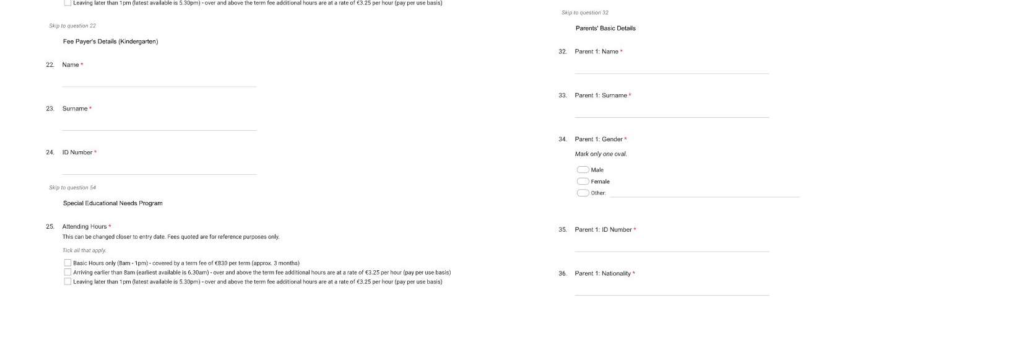
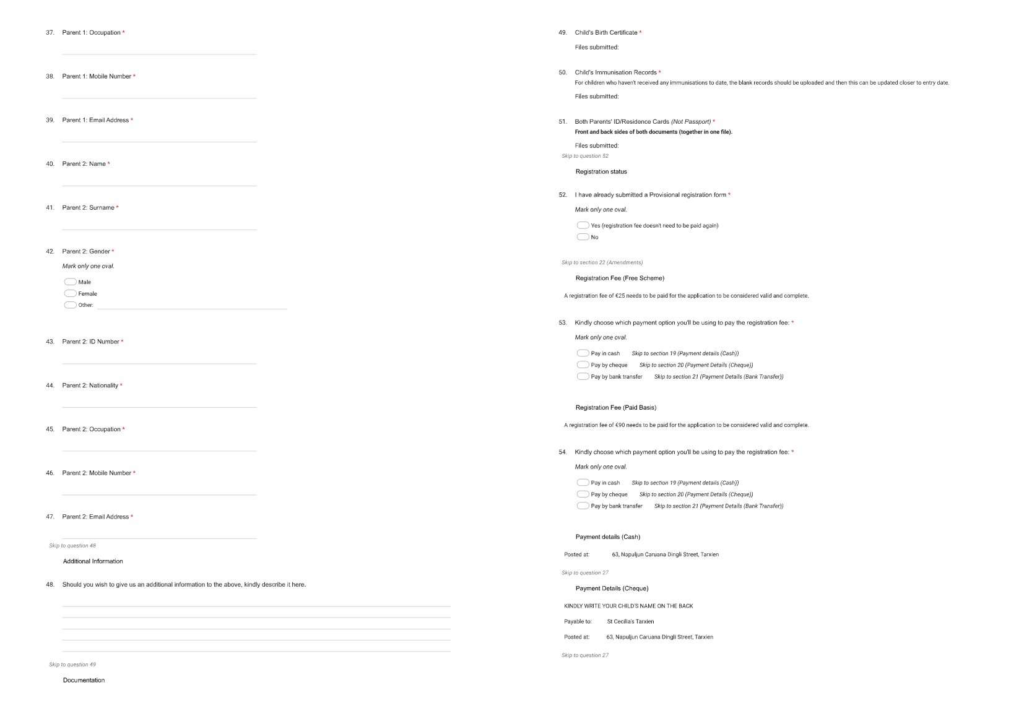
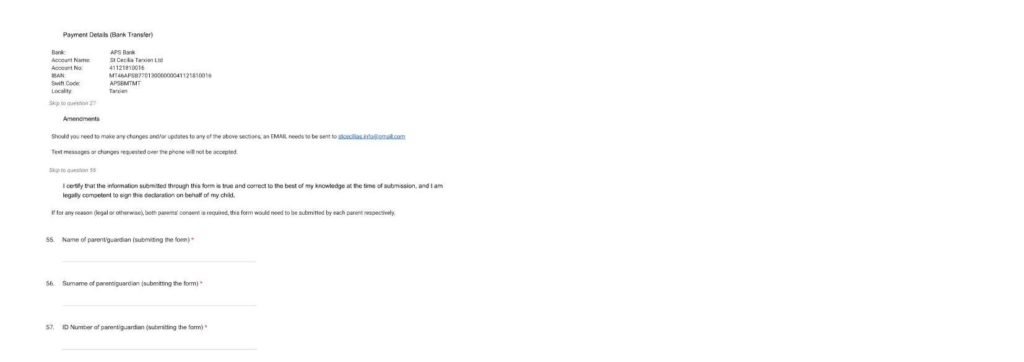
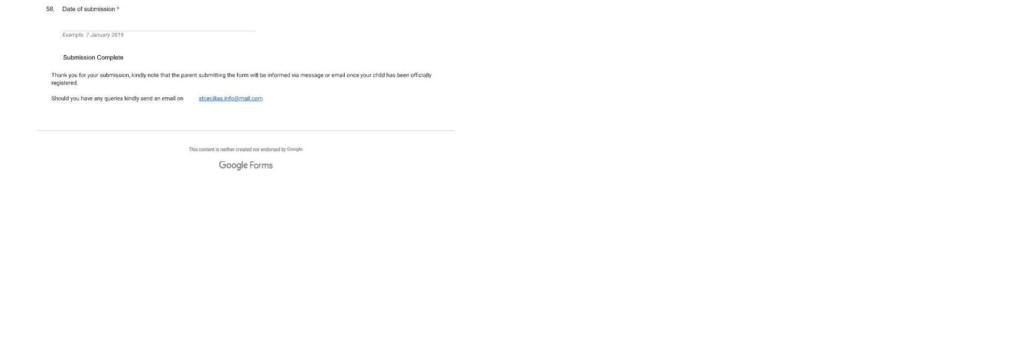
Parental Consents
Our parent consent forms for generic situations are distributed online to parents of registered children closer to their child’s entry date at our center.
Please keep an eye out for the online parent consent forms and complete them promptly. These forms cover various situations like photo/video permissions, emergency contacts, and medical information.
Using the online form streamlines the consent collection process and ensures accurate information for each child in our care.
We appreciate your cooperation in promptly completing the online parent consent forms as it helps us provide the best care and support for your child during their time at our center.
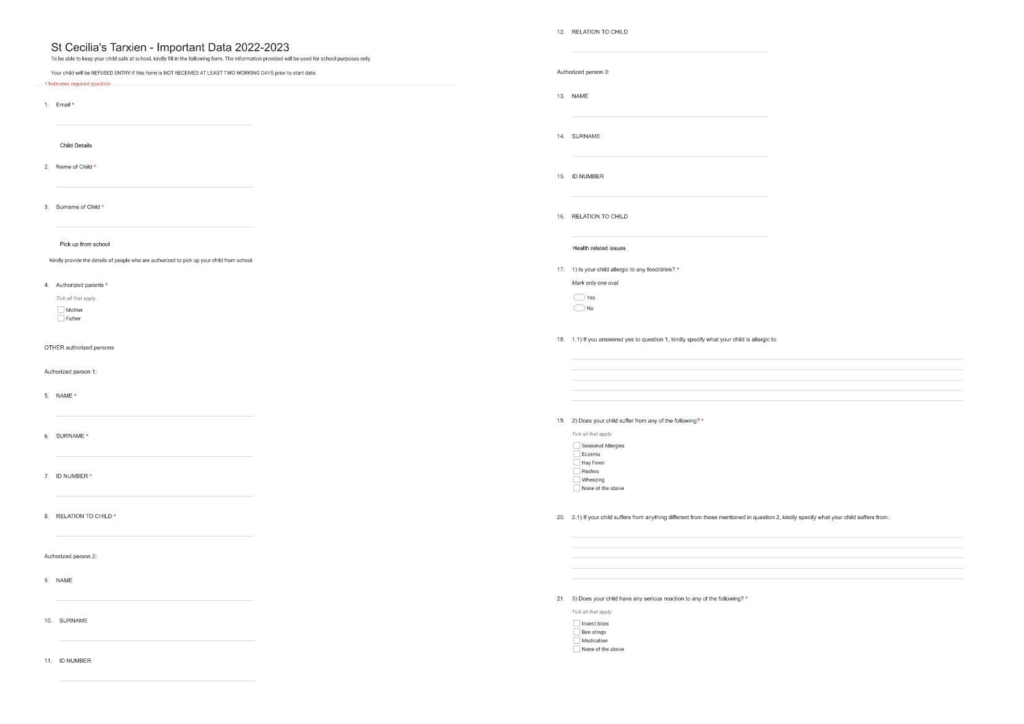
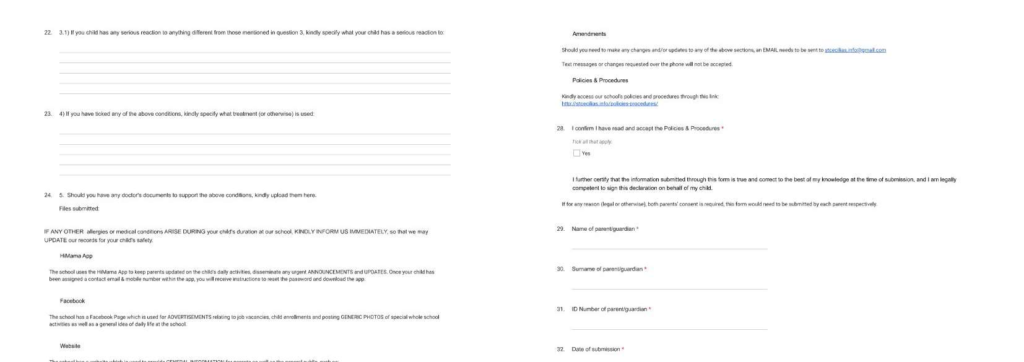
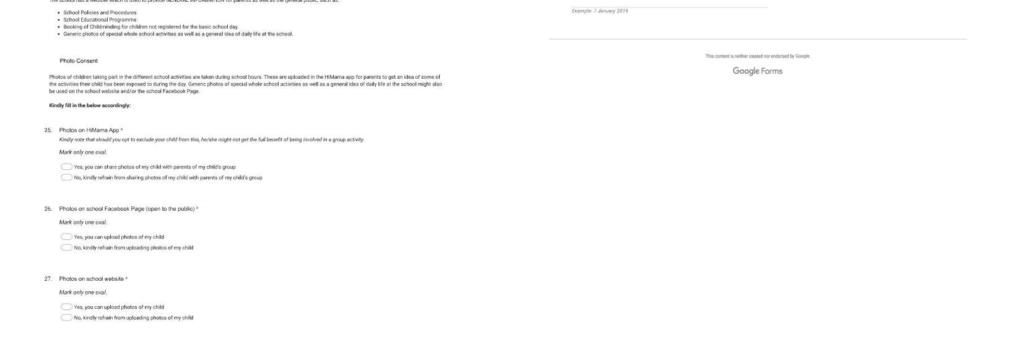
Injury Report Form
Our injury/accident forms are school property and used accordingly in case of incidents at school. If your child is involved in an injury or accident, we will fill out the necessary details on the form and contact you
accordingly.
When you come to pick up your child, we will ask you to review and sign the injury/accident form. This process ensures that you are informed about the incident and acknowledges the provided information.
The safety and well-being of your child are our top priority, and these forms help us maintain accurate records and take appropriate action when needed.
We appreciate your cooperation as we strive to create a safe environment for all students at our school.
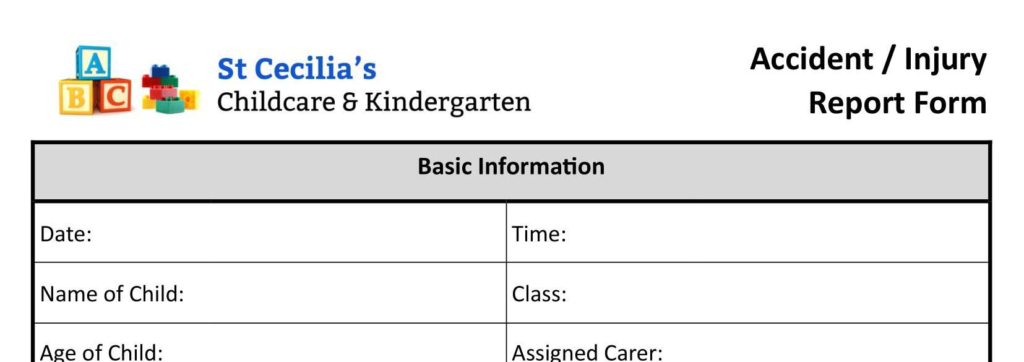
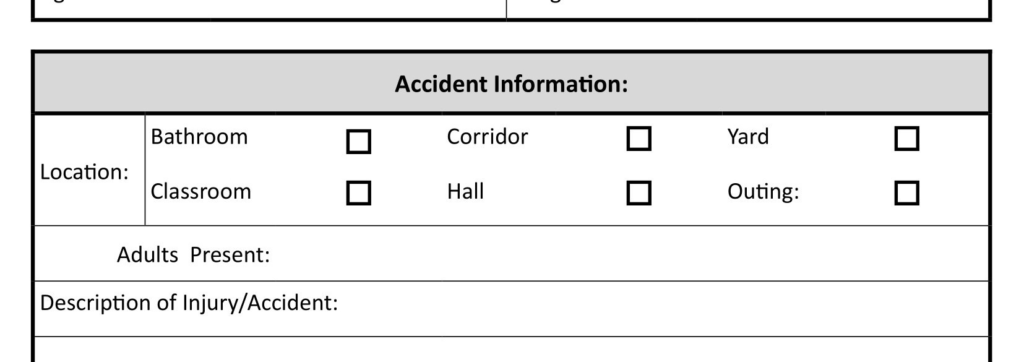
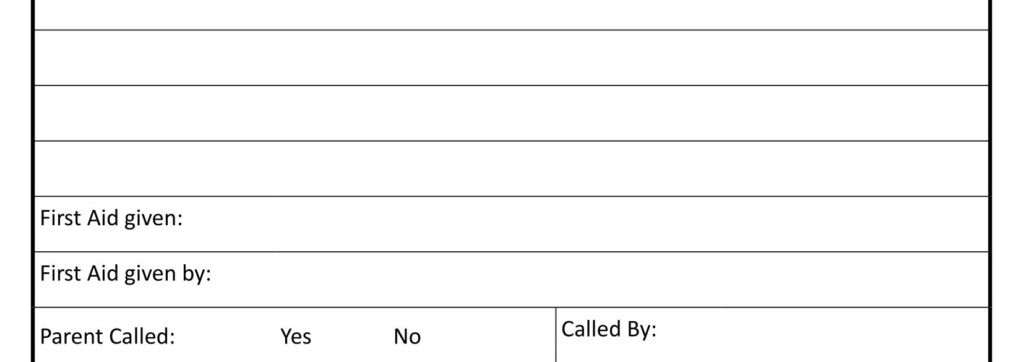
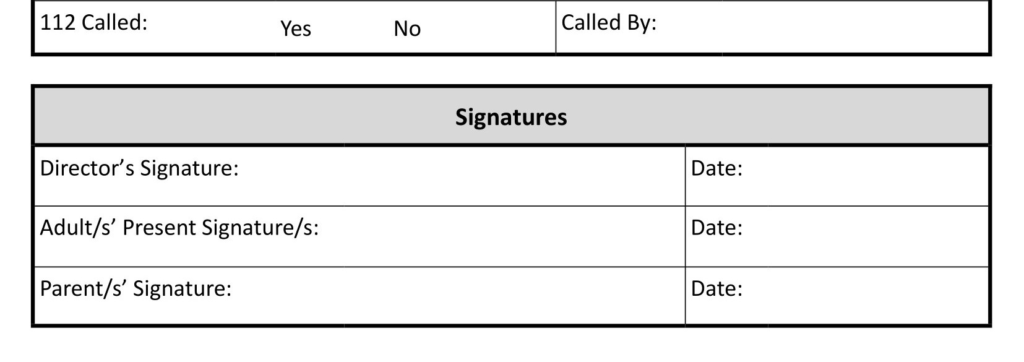
Cleaning Routines
Cleanliness is a top priority at our center. Our dedicated team, including childcare workers and a resident
cleaner, work together to maintain a clean and safe environment for the children.
Responsibilities:
Childcare workers clean items used during daily activities, while the resident cleaner takes care of other areas and items in the center. They perform a final wipe down of individual areas at the end of the day.
Commitment to Hygiene:
Our team is committed to ensuring comprehensive cleanliness throughout the center. We prioritize the health and well-being of all children in our care.
We appreciate your trust in our efforts to provide a clean and safe space for your child.
